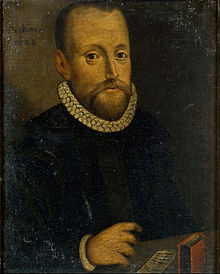
Back ويليام بيركنز ARZ William Perkins (Theologe) German William Perkins French William Perkins Frisian ויליאם פרקינס HE William Perkins ID William Perkins Italian 윌리엄 퍼킨스 Korean William Perkins Dutch William Perkins Portuguese
William Perkins | |
|---|---|
 Painting by an unknown artist inscribed 1602 | |
| Born | 1558 |
| Died | 1602 (aged 43–44) |
| Alma mater | Christ's College, Cambridge |
| Occupation(s) | Clergyman, Theologian |
| Notable work | The Arte of Prophesying |
| Spouse | Timothye Cradocke |
| Theological work | |
| Era | Elizabethan era |
| Tradition or movement | Puritanism, Calvinism |
| Notable ideas | Law and Gospel |
William Perkins (1558–1602) was an influential English cleric and Cambridge theologian, receiving a B.A. and M.A. from the university in 1581 and 1584 respectively, and also one of the foremost leaders of the Puritan movement in the Church of England during the Elizabethan era. Although not entirely accepting of the Church of England's ecclesiastical practices, Perkins conformed to many of the policies and procedures imposed by the Elizabethan Settlement. He did remain, however, sympathetic to the non-conformist puritans and even faced disciplinary action for his support.
Perkins was a prolific author who penned over forty works, many of which were published posthumously. In addition to writing, he also served as a fellow at Christ's College and as a lecturer at St. Andrew's Church in Cambridge. He was a firm proponent of Reformed theology, particularly the supralapsarian theology of Theodore Beza. In addition, he was a staunch defender of Protestant ideals, specifically the five solae with a particular emphasis on solus Christus and sola Scriptura.